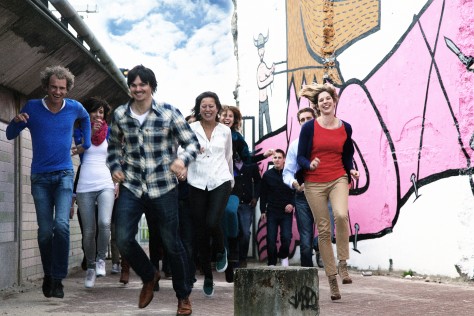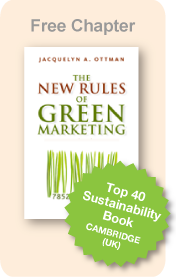Jacquie Ottman's
Green Marketing Blog
Sustainable Innovation 2013: Key Lessons
December 05, 2013 by Jacquelyn Ottman

Every year I head to Europe to take part in the Sustainable Innovation Conference organized by The Centre for Sustainable Design (UK) as part of its ‘Towards Sustainable Product Design’ series of conferences. Sustainable Innovation brings together pioneers, movers and shakers from around the world and across multiple industries who are changing the game of sustainable design to present their ground-breaking concepts and ideas. This year’s program, as always provided a glimpse into the leading edge of ideas and concepts for addressing sustainability through design and innovation.
I was invited to present my vision for creating a waste-free culture and our new website and blog, WeHateToWaste.com as part of this year’s conference themed, “Collaboration, Co-creation & New Business Models: Personal Visions, Perspectives and Stories.”
As a follow up to the conference, Martin Charter, Director of The Centre for Sustainable Design (UK) summarized the event by preparing this video recap, as well as itemizing the following key lessons:
1. Foresight: Adaption to climate change, circular economy & eco-innovation are now being hardwired into future European industrial policy scenarios; with thinking on eco-innovation now breaking away from the traditional definition of eco-industries based on ‘end of pipe’ environmental technologies towards a more horizontal view based on a pervasive ‘greening of industry’ & the development of a diverse array of eco-innovative products, services & technologies.
2. Circular Economy: Leading companies are implementing ‘design for disassembly’ & ‘design for upcycling’ in product design & development e.g., Kyocera (printer cartridges) & Globe Hope (clothing) but are finding a lack of infrastructure, knowledge, networks, skills, etc. to support these initiatives; where is the ‘smart (closed loop) grid’ discussion to enable the Circular Economy? & how should it be developed?
3. Disruption: New players entering existing markets with disruptive eco-innovative technologies can experience a very bloody fight with aggressive responses from incumbents; NestLabs highlighted the need for significant financial resources to fight legal battles, the importance of design, monitoring & quickly responding to customer feedback & creating a ‘can do’ mindset; Globe Hope & ZedFactory highlighted the need to stick to core values, the importance of personal resilience, having a solutions oriented mindset (to problems) & a lack of public policy support for sustainable & eco-innovators.
4. Business Models: An emerging question is, do green business models actually exist? & perhaps that the question needs to be re-framed; growing energy, material & water challenges are leading a number of companies to adapt their business models; many eco-innovative SMEs have a product/technology push mindset & lack sound business models, so there is a need for widespread dissemination of business model thinking amongst sustainable & eco-innovators; more strategically, ‘green ventures’ units are emerging within a number of leading companies e.g., Patagonia & Nike stimulating & financially pump-priming new & potentially disruptive sustainable & eco-innovative start up businesses.
5. Democratisation: Stronger ‘grassroots innovation’ is emerging through ‘people power’ facilitated by social networks, & information & communication technology (ICT) which is characterised by growing trends in the use of ‘open innovation’ including crowd sourcing ideas & funding, & the rise of makers & fixers.
6. Collaboration: Open innovation & crowdsourcing approaches are being used to co-create new businesses with collaboration & partnership being essential; developing & building relationships & trust will be viewed as as central principles to the co-creation of businesses. An excellent example is Enviu, an organization that creates innovative businesses with positive environmental and social impact (pictured above).
7. Freedom: Breaking away from conventional thinking patterns & practice needs organisations, groups & individuals that that can operate outside ‘the system’; an ability to experiment & ‘break the rules’ will be increasingly important; however, ‘breakaway organisations’ e.g. Enviu from the Netherlands that operate more openly, un-conventionally & un-reasonably will still need to have well organised structures & systems especially related to funding & project delivery.
8. Demonstration: It was highlighted that people need access to real, physical demonstrations of more sustainable futures to enable them to ‘see’ a way forward, this was well illustrated by Bright Green Island (a ‘living laboratory’ for sustainable solutions in Denmark), Pines Calyx (‘cradle to cradle’ conference centre in UK) & Village Impact (socially designed and innovated kitchens in Malawi).
9. Systems: To drive sustainable & eco-innovation there is a need to operate in parallel at grassroots & system levels, & this requires business, civil society & government to develop better ways of working together - however, presently sustainable or eco-innovation seems to be emerging from civil society & business, with government’s role being seen as increasingly unclear.
10. Capitalism 2.0: Green growth & green economy is permeating global policy thinking however ‘grassroots innovation’ is emerging from civil society & entrepreneurs rather than big business or NGOs; alongside this, new business models are emerging where business success & performance are not just being judged by financial success but also by positive environmental & social impact.
© Martin Charter 2013 .(JavaScript must be enabled to view this email address)
I encourage you to learn more about this important conference and its ability to exchange ideas with leading edge European sustainability thinkers. For more information about the Centre for Sustainable Design and the conference, visit their website.
Jacquelyn Ottman is founder and principal of J. Ottman Consulting, Inc. NYC-based experts on green marketing and eco-innovation. She is the author of The New Rules of Green Marketing: Strategies, Tools, and Inspiration for Sustainable Branding (Berrett-Koehler 2011). Earlier this year, her firm launched WeHateToWaste.com, an online global community of consumers looking to prevent household waste, conserve natural resources and get the most from the products they buy.
Recent Blog Posts
Why Consumers Care About Restaurant Food Waste
R-R- Redundancy - a New ‘R’ to Heed
New E-Report on What 2012 FTC Green Guides Update Means for Marketers



 ShareThis
ShareThis

